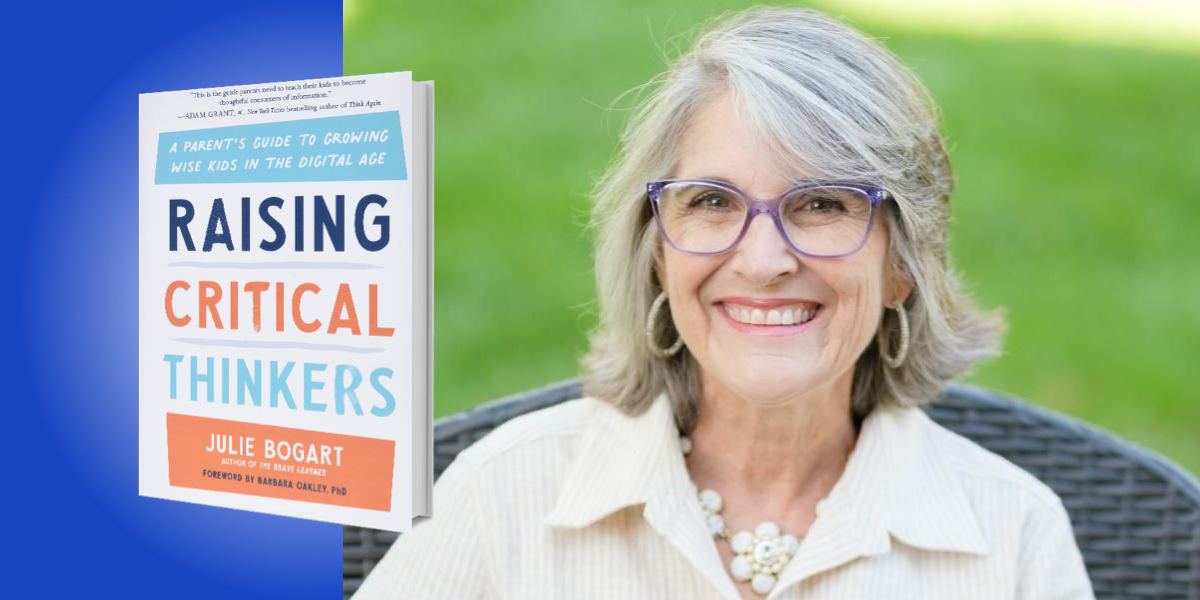Julie Bogart is the founder of Brave Writer, a writing and language arts resource, as well as a homeschool coaching program called Brave Learner Home. She has five children who were homeschooled, and experienced public high school.
Below, Julie shares 5 key insights from Raising Critical Thinkers: A Parent’s Guide to Growing Wise Kids in the Digital Age. Listen to the audio version—read by Julie herself—in the Next Big Idea App.

1. Self-awareness matters.
Most of us wish those people over there (the ones we don’t agree with) would be better critical thinkers. In fact, like driving, nearly everyone thinks they’re good at it and everyone else isn’t. To be a quality thinker, it’s important to take an “academic selfie”—to flip the camera lens and notice what’s going on with ourselves when we’re confronted with an idea or interpretation of information. We can notice a flash of embarrassment or anger. Perhaps a knot in our stomachs, or a surge of confirmation that feels like triumph. This experience happens to kids in our care a lot.
We declare the rightness of our ideas without allowing our kids to collect their own data, reference their experiences, or identify questions that lead to better solutions. Imagine telling your five-year-old to wash their hands before dinner. If that five-year-old doesn’t want to, what will you do? Maybe you’ll say, “You must, because according to science, there are germs, invisible to you, that will make you sick.” But is that true? Didn’t that five-year-old just eat Cheerios off the floor without getting sick?
We can encourage self-aware thinking by asking questions rather than declaring answers. Maybe say instead, “Let’s see what you don’t like about washing hands. Is it the coldness of the water? Let’s use a thermometer to find out what temperature you like best. Or is it the wetness? Shall we try hand sanitizer that dries more quickly, or a blow dryer that uses heat to kill germs? Maybe we can roll the dice for a week and see if you get sick from not washing your hands.”
All experiences are an opportunity to cultivate self-aware thinking.
“We declare the rightness of our ideas without allowing our kids to collect their own data, reference their experiences, or identify questions that lead to better solutions.”
2. Get in the habit of asking: “Says who?”
Any time your child reads a book or watches a film, it’s a great idea to identify who’s telling the story. The storyteller shapes the interpretation. When we forget that there could be other storytellers with different perspectives, we sometimes overvalue the default narrator.
I discovered early on that I could read a fairytale, like The Three Little Pigs, and my children would just assume that the version I was telling them was the ultimate truth. Then, along would come another version that tells the same story from the wolf’s perspective, and disorientation followed. Suddenly there was another way to think about the very same information. One practice that became reflexive in my family was to ask during films, “Whose story is not being told? Can we trust this narrator? How would this story sound if told by a different character?”
All learning comes through the lens of the storyteller—historian, scientist, author, researcher. Critical thinking includes the ability to identify the storytellers, as well as those whose stories are not being told. Identifying sources and vetting them is the next level of critical thinking, which starts with caring to know.
3. Loyalty to a community has an impact on thinking.
Our identities shape our thinking more than we are aware. Children, in particular, are susceptible to taking on the beliefs of the adults who raise or teach them. Paolo Friere, an education reformer, said that we come not as empty vessels to the learning experience, but rather with minds filled to the brim with experiences, relationships, personal histories, religious influence, and socioeconomic circumstances. When we learn, we filter each idea through a series of invisible checkpoints that help us retain our valuable community memberships.
“We come not as empty vessels to the learning experience, but rather with minds filled to the brim with experiences, relationships, personal histories, religious influence, and socioeconomic circumstances.”
It’s helpful to identify what’s at stake while considering an idea. Will you or your kids lose membership in a valuable community? Will you violate an unspoken assumption of which ideas you are allowed to hold?
Our loyalties are the most significant factor in shaping how we think—whether we’re loyal to a profession, a radio talk show host, a football team, or our family heritage.
4. Thinking well requires depth.
Most of us read to get information. Reading is great for detail and consuming a quantity of facts—but reading is also incredibly safe and limited. For instance, you can read everything you ever wanted about a violin, but if you’ve never heard one played, all the reading in the world will not help you know the violin. So when we form opinions, reading is never enough.
We add experiences to reading and find that we’ve acquired another level of comprehension, which enriches how we think. Listening to a violin in a symphony reveals what reading could never deliver. Listening to bluegrass on a fiddle opens another world entirely.
The most powerful tool in the critical thinking box is encountering. An encounter destabilizes the power dynamic. Put a violin in the hands of a novice, and this encounter will reveal nuance not available through reading and experiencing. Encounters with people, in particular, lead to some of our most profound shifts in thinking.
“You can read everything you ever wanted about a violin, but if you’ve never heard one played, all the reading in the world will not help you know the violin.”
Whenever we study any subject, unless we’ve added experiences and encounters to what we read, we do not have enough depth to have a true critical thinking perspective. Kids benefit from this three-pronged approach to learning to think.
5. Interpretations are temporary.
Most importantly, all that we know is filtered through our interpretations—facts, data, research, personal experience, or intuition. Interpretations are the result of considering the original intent of the creator while also identifying the current environment of the interpreter. Taken together, an interpretation is born.
When we choose a viewpoint based on an interpretation, it means we are using our best understanding available. What makes someone a true critical thinker is the ability to pivot when new information surfaces—to have the courage to change their mind. As an important adult in a child’s life, it’s incredibly valuable to allow your children to see that you’ve survived the times you’ve changed your mind, so that they know it’s safe to change theirs, too. Interpretations persist until they fall to a brand-new understanding of the same information. When we think about critical thinking, it’s helpful to hold all interpretations gently, knowing that they reflect our current context as much as the attempt to address the original intent of the author.
In my book, I’ve provided oodles of activities designed for kids ages 5-18 that any adult can use to help grow these skills in their children—whether through video games or grammar, poetry or statistics. What’s been exciting to see is that the adults find these skills and tools equally valuable in their own lives, whether in a social media comment thread or while engaged in a heated conversation with a loved one.
To listen to the audio version read by author Julie Bogart, download the Next Big Idea App today:































